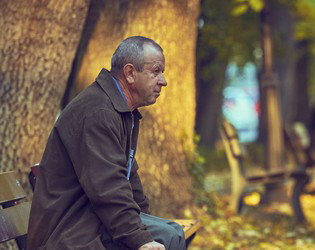He stares straight ahead, not acknowledging me. He’s having a bad day.
After a while I start again. I stick my face directly in front of his and say a little more loudly, “It’s Pat, Dad.”
A low voice speaks at last: “We all know who Pat is.”
That’s my Dad having a moment of lucidity, a gift. I haven’t lost him totally yet; his wit and humour are still in that brain somewhere, remnants of his true self.
When I was growing up, of my two parents, Dad was the tough one, the disciplinarian who wielded the hairbrush as a threat and a tool of correction. The one who, on viewing my report card, asked “What did Karen get?” The one who yelled at me during driving lessons to go faster and faster backward in circles in a field. The one who baited me about women’s issues.
My father had been the breadwinner and decision-maker in our home. Against my will he arranged with the principal of my high school that I study Latin. He sent me to the university of his choice. He was stern and dictatorial, assuming he knew what was best for us. He was not the kind of father you cuddled up to in an easy chair. He performed his duty as a man of his generation. How I longed for him to be the kind of father I could talk to instead of argue with.
After my mother died, Dad spent two years alone in the house, then moved into a retirement home where he soon became engaged to a lady.
When he didn’t show up for breakfast one day, she found him passed out on the floor from a severe bladder infection. He came close to death but after a month in hospital he recovered. Then he had to move to a home with 24-hour nursing supervision. He lost contact with his fiancée; she died of cancer; he forgot all about her. They had had two years of fun. The dementia was a gift that saved him from having to mourn again.
Following Dad’s hospital stay I had to accompany him to a proctologist appointment, to take notes about his penile and bladder functions. This was my father who had gone to work in a pressed suit every day for 45 years. If he could remember his dignity, he didn’t mention it. He couldn’t remember that there were forbidden topics, like when he had had a prostate operation and did not allow us to visit him in the hospital. Now his care was in my hands and he accepted my authority like a child.
Two years later when he realized his condition was deteriorating, I was present at the assessment for his application to a nursing home. “I know I can’t stay here a lot longer,” Dad said. “When Pat says, ‘You’re going,’ I’ll go.”
I sat stunned when the man who had bossed me around all my life suddenly submitted to my judgment. He made the transition easy for me. Who was this quiet person going gently into that good night?
I used to take him out for a drive on Sunday afternoons. He was nearly blind but he liked to sit beside the lake and sip a chocolate milkshake while listening to the waves lap against the shore. Before leaving for vacation one time, I asked if he would like me to arrange for a volunteer from the seniors’ club to take him for his weekly drive.
He declined. “I like going out with you because you’re you. Not because you have a car.”
This was the father who had never told me he loved me or was proud of me. I guess he forgot to be tough for that one moment.
In his prime, my father was always one to dominate the conversation. How often I resented his endless storytelling, corny jokes, teasing and lecturing. Now he was finishing his days as a quiet man, listening, lonely and hungry for the sound of our voices. What do you say to someone you’ve been waiting all your life to talk to who can no longer understand or respond?
One evening I dropped in to the nursing home for a visit just as the nurse’s aide was preparing Dad for bed. She asked him, “Do you want to have a little visit with your daughter?”
“I’ll keep her as long as I can,” he said. Then I knew it didn’t matter what I said, or if he comprehended, or even if we didn’t speak at all. That was a gift.
During the seven years of my father’s Alzheimer’s disease, my brother, Mike, lived on the other side of the country in Vancouver and was only able to visit once a year. Because Dad could no longer read, Mike sent audio recordings – voice letters – every three weeks. Together Dad and I would listen to the stories of Mike’s life. The beauty of Dad’s memory loss was that on the visits in between we could listen to the same letters over again.
All those years I had been afraid I would miss being with Dad at the crucial time and that he would die alone. The final stage of Alzheimer’s is the inability to swallow, so we knew for two months that Dad was dying. I was able to be with him for his last days. When his breathing became softer and weaker, I put on a voice letter. As Mike was saying goodbye, Dad breathed his last two breaths just as if we were both there with him. The final gift.
Patricia Calder lives in Colborne, Ont.
Taken from The Globe and Mail website at http://www.theglobeandmail.com/life/relationships/my-fathers-alzheimers-gave-us-unexpected-gifts/article578945/















